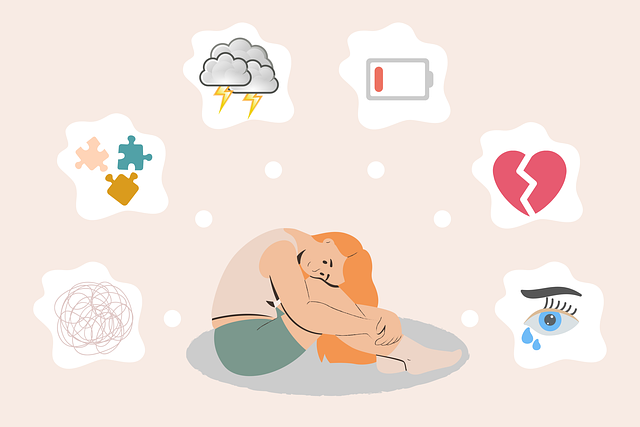Mental health professionals in Louisville face unique challenges like secondary trauma and high-stress environments, leading to issues like anxiety disorders. To mitigate these risks, public awareness campaigns and community outreach are crucial. They advocate for early intervention through tailored therapy programs and workshops focusing on stress management and mental wellness journaling. Comprehensive risk assessment tools help deliver precise diagnoses and personalized coaching, while continuous training and supportive work environments combat stress and burnout. These measures aim to improve treatment outcomes for Louisville panic disorder and anxiety attacks therapy clients.
Mental health professionals (MHPs) face unique risks in their high-pressure roles. This article delves into critical aspects of risk assessment tailored to MHPs, focusing specifically on Louisville’s context regarding panic disorder and anxiety attacks. We explore the distinct challenges faced by this community and the importance of understanding personal resilience. Comprehensive risk assessment tools are discussed alongside continuous training initiatives aimed at mitigating risks and enhancing support for MHPs in their crucial work.
- Understanding Mental Health Professional's Unique Risk Factors
- Louisville Panic Disorder: A Focus on Local Challenges and Prevalence
- Assessing Personal Resilience and Coping Mechanisms
- Implementation of Comprehensive Risk Assessment Tools
- Continuous Training, Support, and Professional Development for Mitigation
Understanding Mental Health Professional's Unique Risk Factors

Mental health professionals, despite their critical role in society, face a unique set of risks that often go overlooked. These professionals are exposed to intense emotional labor daily, absorbing and witnessing the deepest fears, traumas, and struggles of their clients. This constant exposure can lead to secondary trauma, where practitioners experience symptoms similar to those of their patients, such as anxiety, depression, and flashbacks. The nature of their work also puts them at a higher risk for developing conditions like Louisville panic disorder and anxiety attacks due to the high-stress environment.
Several other factors contribute to these risks. Long working hours, often combined with emotional intensity, can lead to burnout. Lack of support systems or inadequate supervision can exacerbate these issues. In addition, mental health professionals may struggle with setting boundaries between their personal and professional lives, further compounding the risk of secondary trauma. Public awareness campaigns focused on depression prevention and community outreach program implementations are vital strategies to mitigate these risks by fostering a supportive environment for both practitioners and their clients.
Louisville Panic Disorder: A Focus on Local Challenges and Prevalence

In Louisville, the prevalence of panic disorder and anxiety attacks is a significant concern within the mental health community. Local studies indicate a higher-than-average incidence rate, particularly among young adults and working professionals. This urban area’s fast-paced lifestyle and high-stress work environments contribute to an increased risk of developing anxiety-related conditions. Many individuals struggle silently, often waiting too long to seek therapy for their panic disorder.
Addressing this local challenge requires a multi-faceted approach. Mental health professionals can play a crucial role in early intervention by offering tailored Anxiety Attacks Therapy and promoting Inner Strength Development. Organizations can organize Stress Management Workshops to educate the community on recognizing symptoms and available treatment options, including evidence-based therapies and Mental Wellness Journaling Exercise Guidance. Such proactive measures aim to reduce the burden of Louisville Panic Disorder and improve access to much-needed support.
Assessing Personal Resilience and Coping Mechanisms

Mental health professionals must also assess their personal resilience and coping mechanisms when managing risks. This involves understanding an individual’s ability to handle stress, adapt to change, and cope with challenging situations. Building on their existing strengths and resources is crucial for maintaining well-being, especially in demanding fields like Louisville panic disorder and anxiety attacks therapy.
Professionals can enhance their resilience through targeted interventions such as stress management workshops offered by organizations dedicated to cultural sensitivity in mental healthcare practice. Developing effective coping strategies not only supports personal growth but also enhances the quality of care provided, making it easier to navigate potential risks and challenges encountered in Louisville panic disorder and anxiety attacks therapy settings.
Implementation of Comprehensive Risk Assessment Tools

Comprehensive risk assessment tools are indispensable for mental health professionals to ensure effective care and treatment planning. These tools allow practitioners to gain a thorough understanding of their clients’ psychological states, past experiences, and potential triggers for conditions like Louisville Panic Disorder and Anxiety Attacks. By implementing these assessments, therapists can identify risks and vulnerabilities early on, enabling them to tailor interventions and develop personalized mental wellness coaching programs.
The process involves careful consideration of various factors, including the individual’s history, current symptoms, and environmental influences. This holistic approach facilitates more precise diagnoses and targeted therapies, ultimately contributing to successful emotional healing processes. With a robust risk assessment framework in place, mental health professionals can better navigate complex cases, enhance treatment outcomes, and foster a supportive environment for their clients’ long-term mental wellness.
Continuous Training, Support, and Professional Development for Mitigation

Mental health professionals face unique challenges that can lead to stress and burnout, which may ultimately impact their ability to provide effective care. To mitigate these risks, continuous training is essential. This includes staying updated on the latest research and treatment methods for conditions like Louisville Panic Disorder and Anxiety Attacks. Regular attendance at workshops, seminars, and conferences allows professionals to exchange knowledge and learn from peers, fostering an environment of ongoing learning and adaptation.
Supportive structures within work environments play a crucial role in professional development. Mentorship programs, peer supervision, and access to emotional wellness coaching programs can provide valuable guidance and support. Encouraging open communication about stress management and self-care practices creates a culture that prioritizes mental wellness. Additionally, incorporating Self-Awareness Exercises and Emotional Regulation techniques into daily practice helps professionals maintain balance and manage their own emotional health, ensuring they remain equipped to support their clients effectively.
Mental health professionals play a vital role in treating anxiety-related disorders like Louisville Panic Disorder and facilitating therapy for those experiencing anxiety attacks. However, they also face unique risk factors that require careful assessment and management. By understanding personal resilience, implementing comprehensive risk assessment tools, and prioritizing continuous training and support, professionals can mitigate these risks effectively. This approach ensures a healthier work environment and enables them to provide the best care possible to their clients.














